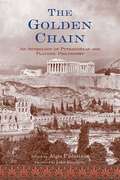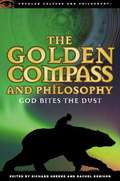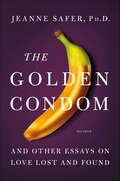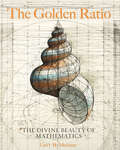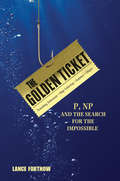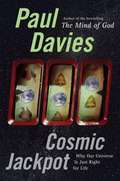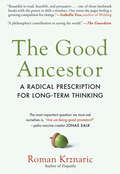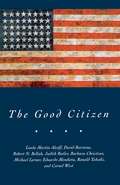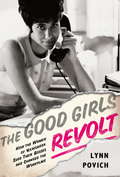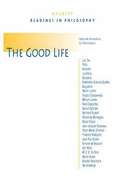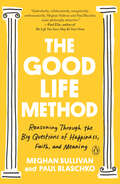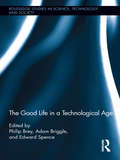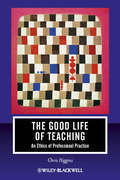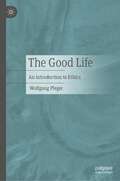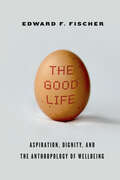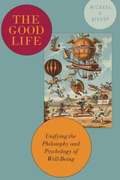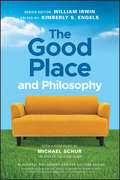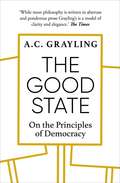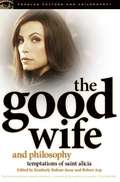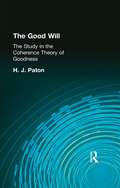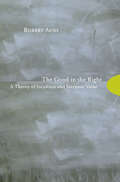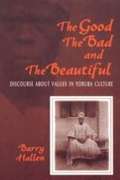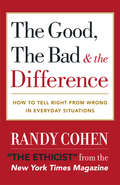- Table View
- List View
The Golden Chain: An Anthology of Pythagorean and Platonic Philosophy
The goal of the ancient philosophers was to understand how to live in harmony with nature and to transcend the limitations imposed by sense experience and discursive reasoning.
The Golden Compass and Philosophy
by Richard Greene Rachel RobisonThe popularity of the His Dark Materials trilogy has generated a major motion picture, a stage play, video games, and a new prequel. The series has also been highly controversial with its use of exciting adventure stories for children to comment on organized religion. These books have piqued the interest of the contributors to this fascinating volume, who use it to probe the philosophical issues that inform them. Could a golden compass, or alethiometer, really work? Can a person's soul or daemon have a mind of its own? What are the ramifications of pursuing the diabolical "intercision" process, or of trying to bring about the death of God, a plot that Lyra and her mysterious Father struggle over? These are some of the questions explored by these essays that try to get to the heart of Lyra's bewildering, inspiring, and multifaceted world.
The Golden Condom: And Other Essays on Love Lost and Found
by Jeanne SaferDr. Jeanne Safer has dedicated much of her decades' long career in psychotherapy to exploring taboo subjects that we all think about in private but seldom discuss in public. From conflicted sibling relationships to the choice not to have children, Safer's work has always been unflinching in its aim to dive deep into topics that make most of us blush, but which are present in all of our lives. In The Golden Condom, Safer turns her sharp and fearless eye to a subject perhaps more universal than any other-love in all its permutations. In The Golden Condom Safer interweaves her own experiences with those of a variety of memorable people, including her patients, telling a series of tales that investigate relationships--both healthy and toxic--that most of us don't escape life without experiencing at least once, including traumatic friendships, love after loss, unrequited or obsessional love and more. Never prescriptive and always entertaining, these stories will demolish any suspicion you might have that you're alone in navigating a turbulent romantic life, and will inspire you with the range of possibilities that exist to find love, however unconventional, and at any age.
The Golden Ratio: The Divine Beauty of Mathematics
by Gary B. MeisnerThis enlightening and gorgeously illustrated book explores the beauty and mystery of the divine proportion in art, architecture, nature, and beyond.From the pyramids of Giza, to quasicrystals, to the proportions of the human face, the golden ratio has an infinite capacity to generate shapes with exquisite properties. Author Gary Meisner has spent decades researching the subject, investigating and collaborating with people across the globe in dozens of professions and walks of life. In The Golden Ratio, he shares his enlightening journey. Exploring the long history of this fascinating number, as well as new insights into its power and potential applications, The Golden Ratio invites you to take a new look at this timeless topic.
The Golden Ticket: P, NP, and the Search for the Impossible
by Lance FortnowThe computer science problem whose solution could transform life as we know itThe P-NP problem is the most important open problem in computer science, if not all of mathematics. Simply stated, it asks whether every problem whose solution can be quickly checked by computer can also be quickly solved by computer. The Golden Ticket provides a nontechnical introduction to P-NP, its rich history, and its algorithmic implications for everything we do with computers and beyond. Lance Fortnow traces the history and development of P-NP, giving examples from a variety of disciplines, including economics, physics, and biology. He explores problems that capture the full difficulty of the P-NP dilemma, from discovering the shortest route through all the rides at Disney World to finding large groups of friends on Facebook. The Golden Ticket explores what we truly can and cannot achieve computationally, describing the benefits and unexpected challenges of this compelling problem.
The Goldilocks Enigma: Why Is the Universe Just Right for Life?
by Paul DaviesPeople have long gazed in wonder at the universe and asked, Why are we here? Until recently, the answer has been the province of priests and philosophers, but now scientists are starting to weigh in with ideas that are both surprising and deeply controversial. In his new book, physicist Paul Davies shows how recent scientific discoveries point to a perplexing fact: many basic features of the physical universe-- from the speed of light to the most humble carbon atom-- seem tailor-made to produce life. A radical new theory says it's because our universe is just one of an infinite number of universes, each one slightly different. Our universe is bio-friendly by accident; we just happened to win the cosmic jackpot. While this multiverse theory is compelling, it has bizarre implications, from infinite copies of each of us to Matrix-like simulated universes. Davies believes there's a more satisfying solution to the question of existence: the observations we make today could help shape the nature of reality in the remote past. If this is true, then life and, ultimately, consciousness aren't just incidental byproducts of nature, but central players in the formation of the universe.
The Golem: What Everyone Should Know About Science
by Harry Collins Trevor PinchScience, it would seem, is neither all good nor all bad. It gives us nuclear accidents and cures for disease, agricultural self-sufficiency and death in space flight. Harry Collins and Trevor Pinch liken science to the Golem, a creature from Jewish mythology, powerful yet potentially dangerous, a gentle, helpful creature that may yet run amok at any moment. Through a series of intriguing case studies of famous and not-so-famous scientific episodes, ranging from relativity and cold fusion to memory in worms and the sex lives of lizards, the authors debunk the idea that science is the straightforward result of competent theorisation, observation and experimentation. Closer to the truth, they suggest, is the realisation that scientific certainty comes from interpreting ambiguous results within an order imposed by scientists themselves. This thought-provoking account will give general readers a new perspective on the place of science in society. '. . . perverse but entertaining . . . the writing is deft, the stories are good and there is not a boring page. ' Nature '. . . a must for every science student. ' Science Reporter
The Good Ancestor: A Radical Prescription For Long-term Thinking
by Roman KrznaricFrom leading philosopher Roman Krznaric, an urgent call to save ourselves and our planet by getting to the root of the current crisis—society’s extreme short-sightedness As heard on NPR’s TED Radio Hour When Jonas Salk developed the polio vaccine, he refused to patent it—forgoing profit so that more lives could be saved. His radical generosity to future generations should inspire us, but leading philosopher Roman Krznaric sees the opposite happening: Our short-term, exploitative mindsets have “colonized the future,” leaving an inexcusable chasm between the haves and have-nots—and mounting existential threats—that have brought our species to the precipice of disaster. Yet Krznaric sees reason to hope. The urgent struggle for intergenerational justice calls for hugely ambitious solutions, from rewiring our growth-at-all-costs economy to giving voters of future generations a voice in our democracies. But at the heart of all these changes is one we can enact within ourselves: We must trade shortsightedness for long-term thinking. In The Good Ancestor, Krznaric reveals six practical ways we can retrain our brains to think of the long view and to shift our allegiance from this generation to all humanity—to save our planet and our future.
The Good Citizen
by David Batstone Eduardo MendietaIn The Good Citizen, some of the most eminent contemporary thinkers take up the question of the future of American democracy in an age of globalization, growing civic apathy, corporate unaccountability, and purported fragmentation of the American common identity by identity politics.
The Good Girls Revolt: How the Women of Newsweek Sued their Bosses and Changed the Workplace
by Lynn PovichIt was the 1960s - - a time of economic boom and social strife. Young women poured into the workplace, but the 'Help Wanted' ads were segregated by gender and the 'Mad Men' office culture was rife with sexual stereotyping and discrimination. <P><P>Lynn Povich was one of the lucky ones, landing a job at Newsweek, renowned for its cutting-edge coverage of civil rights and the 'Swinging Sixties. ' Nora Ephron, Jane Bryant Quinn, Ellen Goodman, and Susan Brown miller all started there as well. It was a top-notch job - - for a girl - - at an exciting place. But it was a dead end. Women researchers sometimes became reporters, rarely writers, and never editors. Any aspiring female journalist was told, 'If you want to be a writer, go somewhere else. ' On March 16, 1970, the day Newsweek published a cover story on the fledgling feminist movement entitled 'Women in Revolt,' forty-six Newsweek women charged the magazine with discrimination in hiring and promotion. It was the first female class action lawsuit - - the first by women journalists - - and it inspired other women in the media to quickly follow suit. <P><P> Lynn Povich was one of the ringleaders. In The Good Girls Revolt, she evocatively tells the story of this dramatic turning point through the lives of several participants. With warmth, humor, and perspective, she shows how personal experiences and cultural shifts led a group of well-mannered, largely apolitical women, raised in the 1940s and 1950s, to challenge their bosses - - and what happened after they did. For many, filing the suit was a radicalizing act that empowered them to 'find themselves' and fight back. Others lost their way amid opportunities, pressures, discouragements, and hostilities they weren't prepared to navigate. <P><P> The Good Girls Revolt also explores why changes in the law didn't solve everything. Through the lives of young female journalists at Newsweek today, Lynn Povich shows what has - - and hasn't - - changed in the workplace.
The Good Life
by Charles GuignonOrganized around themes such as harmony with ones self and with the world, right relation to God, the use of reason, self-exploration, and living in a disordered world, the selections in this anthology explore traditional philosophical thought from Plato to de Beauvoir on the topic of human flourishing.
The Good Life Method: Reasoning Through the Big Questions of Happiness, Faith, and Meaning
by Meghan Sullivan Paul BlaschkoTwo Philosophers Ask and Answer the Big Questions About the Search for Faith and HappinessFor seekers of all stripes, philosophy is timeless self-care. Notre Dame philosophy professors Meghan Sullivan and Paul Blaschko have reinvigorated this tradition in their wildly popular and influential undergraduate course &“God and the Good Life,&” in which they wrestle with the big questions about how to live and what makes life meaningful. Now they invite us into the classroom to work through issues like what justifies our beliefs, whether we should practice a religion and what sacrifices we should make for others—as well as to investigate what figures such as Aristotle, Plato, Marcus Aurelius, Iris Murdoch, and W. E. B. Du Bois have to say about how to live well. Sullivan and Blaschko do the timeless work of philosophy using real-world case studies that explore love, finance, truth, and more. In so doing, they push us to escape our own caves, ask stronger questions, explain our deepest goals, and wrestle with suffering, the nature of death, and the existence of God.Philosophers know that our &“good life plan&” is one that we as individuals need to be constantly and actively writing to achieve some meaningful control and sense of purpose even if the world keeps throwing surprises our way. For at least the past 2,500 years, philosophers have taught that goal-seeking is an essential part of what it is to be human—and crucially that we could find our own good life by asking better questions of ourselves and of one another. This virtue ethics approach resonates profoundly in our own moment.The Good Life Method is a winning guide to tackling the big questions of being human with the wisdom of the ages.
The Good Life in a Technological Age (Routledge Studies in Science, Technology and Society)
by Adam Briggle Philip Brey Edward SpenceModern technology has changed the way we live, work, play, communicate, fight, love, and die. Yet few works have systematically explored these changes in light of their implications for individual and social welfare. How can we conceptualize and evaluate the influence of technology on human well-being? Bringing together scholars from a cross-section of disciplines, this volume combines an empirical investigation of technology and its social, psychological, and political effects, and a philosophical analysis and evaluation of the implications of such effects.
The Good Life of Teaching: An Ethics of Professional Practice (Journal of Philosophy of Education #22)
by Chris HigginsThe Good Life of Teaching extends the recent revival of virtue ethics to professional ethics and the philosophy of teaching. It connects long-standing philosophical questions about work and human growth to questions about teacher motivation, identity, and development. Makes a significant contribution to the philosophy of teaching and also offers new insights into virtue theory and professional ethics Offers fresh and detailed readings of major figures in ethics, including Alasdair MacIntyre, Charles Taylor, and Bernard Williams and the practical philosophies of Hannah Arendt, John Dewey and Hans-Georg Gadamer Provides illustrations to assist the reader in visualizing major points, and integrates sources such as film, literature, and teaching memoirs to exemplify arguments in an engaging and accessible way Presents a compelling vision of teaching as a reflective practice showing how this requires us to prepare teachers differently
The Good Life: An Introduction to Ethics
by Wolfgang PlegerThe book offers a historical-systematic overview of the most important concepts of ethics, each of which is presented using three to four exemplary main representatives. Central quotations allow textual access to the respective position, which is explained compactly and clearly. With the title “The Good Life” the author points to the anthropological basis of all ethics. The book is interdisciplinary in nature, incorporating philosophical approaches as well as those from the fields of theology, biology, psychology, sociology, and politics. For the 2nd edition, the book will be expanded to include the chapter “Education - Pedagogical Ethics” and a chapter on universal human rights.
The Good Life: Aspiration, Dignity, and the Anthropology of Wellbeing
by Edward F. FischerWhat could middle-class German supermarket shoppers buying eggs and impoverished coffee farmers in Guatemala possibly have in common? Both groups use the market in pursuit of the "good life. " But what exactly is the good life? How do we define wellbeing beyond material standards of living? While we all may want to live the good life, we differ widely on just what that entails. In "The Good Life," Edward Fischer examines wellbeing in very different cultural contexts to uncover shared notions of the good life and how best to achieve it. With fascinating on-the-ground narratives of Germans' choices regarding the purchase of eggs and cars, and Guatemalans' trade in coffee and cocaine, Fischer presents a richly layered understanding of how aspiration, opportunity, dignity, and purpose comprise the good life.
The Good Life: Unifying The Philosophy And Psychology Of Well-being
by Michael A. BishopPhilosophers defend theories of what well-being is but ignore what psychologists have learned about it, while psychologists learn about well-being but lack a theory of what it is. In The Good Life, Michael Bishop brings together these complementary investigations and proposes a powerful, new theory for understanding well-being. The network theory holds that to have well-being is to be "stuck" in a self-perpetuating cycle of positive emotions, attitudes, traits and accomplishments. For someone with well-being, these states - states such as joy and contentment, optimism and adventurousness, extraversion and perseverance,strong relationships, professional success and good health - build upon and foster each other. They form a kind of positive causal network (PCN), so that a person high in well-being finds herself in a positive cycle or "groove. " A person with a lesser degree of well-being might possess only fragments of such a network - some positive feelings, attitudes, traits or successes, but not enough to kick start a full-blown, self-perpetuating network. Although recent years have seen an explosion of psychological research into well-being, this discipline, often called Positive Psychology, has no consensus definition. The network theory provides a new framework for understanding Positive Psychology. When psychologists investigate correlations and causal connections among positive emotions, attitudes, traits, and accomplishments, they are studying the structure of PCNs. And when they identify states that establish, strengthen or extinguish PCNs, they are studying the dynamics of PCNs. Positive Psychology, then, is the study of the structure and dynamics of positive causal networks. The Good Life represents a new, inclusive approach to the study of well-being, an approach committed to the proposition that discovering the nature of well-being requires the knowledge and skills of both the philosopher in her armchair and the scientist in her lab. The resulting theory provides a powerful, unified foundation for future scientific and philosophical investigations into well-being and the good life.
The Good Place and Philosophy: Everything is Forking Fine! (The Blackwell Philosophy and Pop Culture Series)
by William IrwinDive into the moral philosophy at the heart of all four seasons of NBC’s The Good Place, guided by academic experts including the show’s philosophical consultants Pamela Hieronymi and Todd May, and featuring a foreword from creator and showrunner Michael Schur Explicitly dedicated to the philosophical concepts, questions, and fundamental ethical dilemmas at the heart of the thoughtful and ambitious NBC sitcom The Good Place Navigates the murky waters of moral philosophy in more conceptual depth to call into question what Chidi’s ethics lessons—and the show—get right about learning to be a good person Features contributions from The Good Place’s philosophical consultants, Pamela Hieronymi and Todd May, and introduced by the show’s creator and showrunner Michael Schur (Parks and Recreation, The Office) Engages classic philosophical questions, including the clash between utilitarianism and deontological ethics in the “Trolley Problem,” Kant’s categorical imperative, Sartre’s nihilism, and T.M Scanlon's contractualism Explores themes such as death, love, moral heroism, free will, responsibility, artificial intelligence, fatalism, skepticism, virtue ethics, perception, and the nature of autonomy in the surreal heaven-like afterlife of the Good Place Led by Kimberly S. Engels, co-editor of Westworld and Philosophy
The Good State: On the Principles of Democracy
by A. C. GraylingThe foundations upon which our democracies stand are inherently flawed, vulnerable to corrosion from within. What is the remedy? A. C. Grayling makes the case for a clear, consistent, principled and written constitution, and sets out the reforms necessary – among them addressing the imbalance of power between government and Parliament, imposing fixed terms for MPs, introducing proportional representation and lowering the voting age to 16 (the age at which you can marry, gamble, join the army and must pay taxes if you work) – to ensure the intentions of such a constitution could not be subverted or ignored. As democracies around the world show signs of decay, the issue of what makes a good state, one that is democratic in the fullest sense of the word, could not be more important. To take just one example: by the simplest of measures, neither Britain nor the United States can claim to be truly democratic. The most basic tenet of democracy is that no voice be louder than any other. Yet in our &‘first past the post&’ electoral systems a voter supporting a losing candidate is unrepresented, his or her voice unequal to one supporting a winning candidate, who frequently does not gain a majority of the votes cast. This is just one of a number of problems, all of them showing that democratic reform is a necessity in our contemporary world.
The Good Wife and Philosophy
by Robert Arp Kimberly Baltzer-JarayIn The Good Wife and Philosophy, fifteen philosophers look at the deeper issues raised by this stirring TV drama. The Good Wife gives us courtroom battles in the tradition of Perry Mason, with the added dimension of a political intrigue and a tormented personal story. We witness the interplay between common morality and legal correctness; sometimes following one violates the other. Lawyers operate within the law and within legal ethics, yet routinely do harmful things in pursuit of their clients' interests. The adversarial system leads to such strategies as stringing out a case to exhaust the other side's resources and bringing suits ostensibly because of wrongdoing by defendants but really to curtail the defendants as a competitive threat to some important client's interest.The idea for The Good Wife came from the recurring news drama of wives standing by their husbands when scandal breaks: the wives of Bill Clinton, Elliott Spitzer, and John Edwards. Often these politicians' spouses are themselves lawyers who have had to cope with the gray areas of legal battles and maneuvering. Following her husband's disgrace and imprisonment, Alicia Florrick has to return to the law, which she abandoned for the sake of being a full-time wife and mother.
The Good Will: A Study in the Coherence Theory of Goodness
by Paton, H JFirst published in 2002. Routledge is an imprint of Taylor & Francis, an informa company.
The Good in the Right: A Theory of Intuition and Intrinsic Value
by Robert AudiThis book represents the most comprehensive account to date of an important but widely contested approach to ethics--intuitionism, the view that there is a plurality of moral principles, each of which we can know directly. Robert Audi casts intuitionism in a form that provides a major alternative to the more familiar ethical perspectives (utilitarian, Kantian, and Aristotelian). He introduces intuitionism in its historical context and clarifies--and improves and defends--W. D. Ross's influential formulation. Bringing Ross out from under the shadow of G. E. Moore, he puts a reconstructed version of Rossian intuitionism on the map as a full-scale, plausible contemporary theory. A major contribution of the book is its integration of Rossian intuitionism with Kantian ethics; this yields a view with advantages over other intuitionist theories (including Ross's) and over Kantian ethics taken alone. Audi proceeds to anchor Kantian intuitionism in a pluralistic theory of value, leading to an account of the perennially debated relation between the right and the good. Finally, he sets out the standards of conduct the theory affirms and shows how the theory can help guide concrete moral judgment. The Good in the Right is a self-contained original contribution, but readers interested in ethics or its history will find numerous connections with classical and contemporary literature. Written with clarity and concreteness, and with examples for every major point, it provides an ethical theory that is both intellectually cogent and plausible in application to moral problems.
The Good, The Bad, And The Beautiful: Discourse About Values In Yoruba Culture
by Barry HallenIn Yoruba culture, morality and moral values are intimately linked to aesthetics. The purest expression of beauty, at least for human beings, is to possess good moral character. But how is moral character judged? How do actions, and especially words, reveal good moral character in a culture that is still significantly based on oral tradition? In this original and intimate look at Yoruba culture, Barry Hallen asks the Yoruba onisegun―the wisest and most accomplished herbalists or traditional healers, individuals justly reputed to be well versed in Yoruba thought and expression―what it means to be good and beautiful. Posed as an outsider wanting to gain understanding of how to speak Yoruba correctly, Hallen engages the onisegun and has them explain the subtleties and intricacies of Yoruba language use and the philosophy behind particular word choices. Their instructions reveal a striking and profound depiction of Yoruba aesthetic and ethical thought. The detailed interpretations of everyday language that Hallen supplies challenge prevailing Western views that African thought is nothing more than acquiescence to long-established religious or communal values. The philosophy of ordinary language reveals that moral reflection is indeed individual and that evaluations of action and character take place on the basis of clearly and logically delineated criteria. With the onisegun as his guides, Hallen identifies the priorities of Yoruba philosophy and culture through everyday expression and shows that there are rational pathways to both truth and beauty.
The Good, the Bad & the Difference
by Randy CohenThe man behind the New York Times Magazine's immensely popular column "The Ethicist"-syndicated in newspapers across the United States and Canada as "Everyday Ethics"-casts an eye on today's manners and mores with a provocative, thematic collection of advice on how to be good in the real world.Every week in his column on ethics, Randy Cohen takes on conundrums presented in letters from perplexed people who want to do the right thing (or hope to get away with doing the wrong thing), and responds with a skillful blend of moral authority and humor. Cohen's wisdom and witticisms have now been collected in The Good, the Bad & the Difference, a collection of his columns as wise and funny as a combination of "Dear Abby," Plato, and Mel Brooks. The columns are supplemented with second thoughts on (and sometimes complete reversals of) his original replies, follow-up notes on how his advice affected the actions of various letter writers, reactions from readers both pro and con, and observations from such "guest ethicists" as David Eggers and the author's mom. Each chapter also features an "Ethics Pop Quiz," and readers will be invited to post their answers on the book's Web site. The best of them will appear in a future paperback edition of the book.The Good, the Bad & the Difference is divided into seven sections: *Civic Life (what we do in public) *Family Life (what we do at home) *Social Life (what we do in other people's homes) *Commercial Life (what we do in situations where money is a factor) *Medical Life (the rights and obligations of patients and caregivers) *Work Life (ethics for the professional sphere) *School Life (moral questions from and about kids)Each section provides a window into how we live today, shedding light on the ways in which a more ethical approach to the decisions we make, and to our daily behavior, can make a big difference in how we feel about ourselves tomorrow.From the Hardcover edition.
